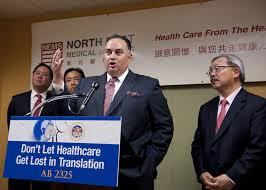Health care for California minorities often lost for lack of translation
• Fil-Am solon Rob Bonta stumps for better access to medical interpreters
• 40 percent of state’s residents speak a language other than English at home
• But state has only 800 certified medical interpreters
 OAKLAND, California – When Khanh Trong Vu, 85, went to Summit Medical Center here with sharp abdominal pains three years ago, doctors and nurses there couldn’t understand what he was trying to tell them in his native Vietnamese. So in desperation he called a Vietnamese friend, Phuong Hang Phi Duong, to interpret for him.
OAKLAND, California – When Khanh Trong Vu, 85, went to Summit Medical Center here with sharp abdominal pains three years ago, doctors and nurses there couldn’t understand what he was trying to tell them in his native Vietnamese. So in desperation he called a Vietnamese friend, Phuong Hang Phi Duong, to interpret for him.
A series of blood tests later, Trong was quickly wheeled into surgery to remove an inflamed appendix.
“I was luckily at home when he called,” noted Duong, whose timely arrival at the hospital Vu believed saved his life.
Though medical interpreters play a vital role in providing medical care, there’s a shortage in these professionals, in part because the state currently does not reimburse language interpreters.
With health care coverage expanded to an additional two million Californians through the Affordable Care Act, community clinics are seeing a need for interpreters like never before.
“There are a number of newly eligible with huge language needs,” asserted Cary Sanders, director of policy analysis with the California Pan-Ethnic Health Network.
A new state bill seeks to boost the number of medical interpreters in the state.
Vu, as well as one other patient, Ti Wu, a native of Myanmar, shared his experience at a June 20 discussion hosted by Assemblymember Rob Bonta, the Democrat who represents the state’s 18th district, on the critical need for interpreters. California has the nation’s largest immigrant community, and 40 percent of its residents speak a language other than English at home.
For people like them, Bonta said, as he stumped for former Speaker John Perez’s bill, AB 2325, which would create a system – called CommuniCal — to improve Medi-Cal beneficiaries’ access to interpreters at physician offices and hospitals in the state, interpreters could make the difference between life and death. Medi-Cal is California’s health care program for its low-income population, known as Medicaid in the rest of the nation.
An identical bill introduced by Perez last year was vetoed by Gov. Jerry Brown, who cited the bad timing created by unprecedented Medi-Cal expansion.
At the Asian Health Care Services (AHCS) in Oakland, where care is provided in 15 languages to its patients who are mostly limited in English proficiency, there was a waiting list of some 5,000 patients prior to the full implementation of the ACA, noted its executive director, Sherry Hirota.
That was before it opened its new facility last year. Many of those 5,000 people, Hirota said, preferred to wait to be seen at the AHCS because they knew they would encounter language barriers at other clinics.
Sean Kirkpatrick, associate director of the Oakland-based Community Health for Asian Americans, said interpreter services are especially important for patients “with stigmatized conditions” such as mental health and HIV. Doctors often tap family members to interpret for them.
“Imagine how shameful it must be for (patients) to talk about their condition” with family members, he said, noting that interpretation services is not “just about language alone, but the interpreter should be competent in social and cultural” issues.
Carlos Garcia, an interpreter, said the bill would also help interpreters as a whole by funding the industry, creating many opportunities for language professionals and companies.
He pointed out that California, with a population of 38 million, has only 800 certified medical interpreters. A more adequate number, if Minnesota were to be considered a role model for the interpreting industry, would be around 120,000, pointed out an aide to Bonta.
AB 2325 has sailed through the Assembly and is currently before the Senate Appropriations Committee. If it becomes law, CommuniCal will be funded 50-50 by the state and federal government.














